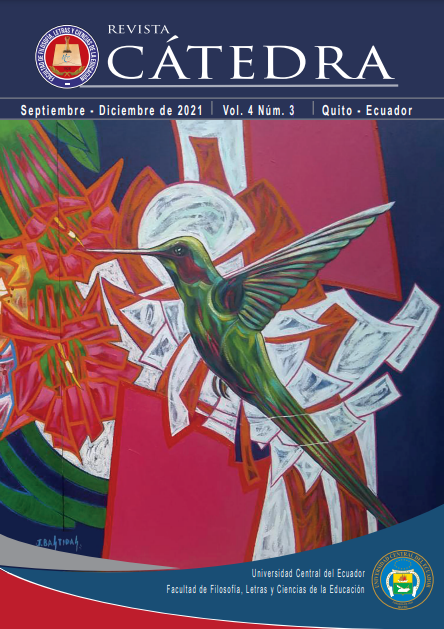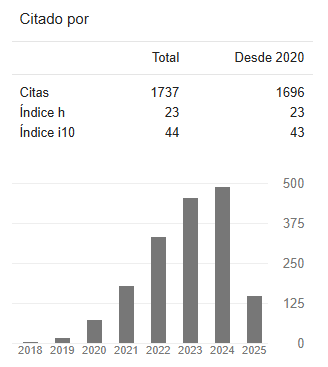Analizando la transición de una educación presencial a una educación remota: una experiencia en la educación superior durante la pandemia de la COVID-19
DOI:
https://doi.org/10.29166/catedra.v4i3.3173Palabras clave:
educación superior, COVID-19, integración de las TIC, desarrollo profesional, teoría de la autodeterminaciónResumen
La integración de las TIC se ha convertido en una de las áreas de investigación más cruciales en el campo de la educación, especialmente durante la pandemia de COVID-19. Como sugiere la literatura especializada, su integración depende en gran medida del nivel de competencia y la voluntad de uso, ya que es el individuo quien finalmente decide integrar las TIC en sus actividades de aprendizaje. La presente investigación se centra en las experiencias de estudiantes y docentes de posgrado que se vieron forzados a integrar las TIC durante la pandemia de COVID-19. Comprender la experiencia de estos actores puede brindar información sobre las mejores formas de fortalecer el diseño y la implementación de iniciativas de desarrollo profesional que faciliten la integración de las TIC. En este estudio, se recogieron las percepciones de estudiantes y docentes a través de cuestionarios y entrevistas analizando su experiencia durante la drástica transición de una educación presencial a una educación remota. Los resultados de este estudio sugieren que, si bien las TIC son aceptado como la mejor alternativa posible durante el período de la transición, los estudiantes y docentes perciben un nivel limitado de competencias en diseño instruccional. Estos resultados y sus implicaciones se discuten en vista de establecer pautas para futuras iniciativas de desarrollo profesional.
Descargas
Citas
Aelterman, N., Vansteenkiste, M., Van den Berghe, L., De Meyer, J., & Haerens, L. (2014). Fostering a Need-Supportive Teaching Style: Intervention Effects on Physical Education Teachers’ Beliefs and Teaching Behaviors. Journal of Sport and Exercise Psychology, 36(6), 595–609. https://doi.org/10.1123/jsep.2013-0229
Ajzen, I. (1991). The theory of planned behavior. Orgnizational Behavior and Human Decision Processes, 50, 179–211. https://doi.org/10.1016/0749-5978(91)90020-T
Cheon, S. H., Reeve, J., Lee, Y., Ntoumanis, N., Gillet, N., Kim, B. R., & Song, Y.-G. (2019). Expanding autonomy psychological need states from two (satisfaction, frustration) to three (dissatisfaction): A classroom-based intervention study. Journal of Educational Psychology, 111(4), 685–702. https://doi.org/10.1037/edu0000306
Cresswell, W. J. (2009). Research Design: Qualitative, Quantitative, and Mixed Methods Approaches. SAGE Publications, 35(2), 260. https://doi.org/10.1017/CBO9781107415324.004
De Rijdt, C., Dochy, F., Bamelis, S., & van der Vleuten, C. (2016). Classification of staff development programmes and effects perceived by teachers. Innovations in Education and Teaching International, 53(2), 179–190. https://doi.org/10.1080/14703297.2014.916543
Farjon, D., Smits, A., & Voogt, J. (2019). Technology integration of pre-service teachers explained by attitudes and beliefs, competency, access, and experience. Computers & Education, 130, 81–93. https://doi.org/https://doi.org/10.1016/j.compedu.2018.11.010
Gegenfurtner, A., Veermans, K., Festner, D., & Gruber, H. (2009). Motivation to Transfer Training: An Integrative Literature Review. Human Resource Development Review, 8(3), 403–423. https://doi.org/10.1177/1534484309335970
Hagenauer, G., Gläser-Zikuda, M., & Moschner, B. (2018). University students’ emotions, life-satisfaction and study commitment: a self-determination theoretical perspective. Journal of Further and Higher Education, 42(6), 808–826. https://doi.org/10.1080/0309877X.2017.1323189
Hattie, J. (2009). Visible learning. A synthetis of over 800 meta-analyses relating to achievement. (Vol. 53, Issue 9). Routledge.
Jaramillo-Baquerizo, C., Valcke, M., & Vanderlinde, R. (2019). Professional development initiatives for university teachers: Variables that influence the transfer of learning to the workplace. Innovations in Education and Teaching International, 56(3), 352–362. https://doi.org/10.1080/14703297.2018.1479283
Jaramillo-Baquerizo, C., Valcke, M., Vanderlinde, R., & Aelterman, N. (2021). Exploring the consideration of university teachers’ basic psychological needs in the design of professional development initiatives. Journal of Higher Education Policy and Management, 43(3), 315–329. https://doi.org/10.1080/1360080X.2020.1812021
Johnson, D. W., Johnson, R. T., & Stanne, M. B. (2000). Cooperative Learning Methods: A Meta-Analysis Methods Of Cooperative Learning: What Can We Prove Works. 1–30.
Kang, H. (2013). The prevention and handling of the missing data. Korean Journal of Anesthesiology, 64(5), 402–406. https://doi.org/10.4097/kjae.2013.64.5.402
Koehler, M. J., Mishra, P., & Cain, W. (2013). What is Technological Pedagogical Content Knowledge (TPACK)? Journal of Education, 193(3), 13–19. https://doi.org/10.1177/002205741319300303
Reeve, J. (2009). Why Teachers Adopt a Controlling Motivating Style Toward Students and How They Can Become More Autonomy Supportive. Educational Psychologist, 44(3), 159–175. https://doi.org/10.1080/00461520903028990
Ryan, R. M., & Deci, E. L. (2000). Self-determination theory and the facilitation of intrinsic motivation, social development, and well-being. American Psychologist, 55(1), 68–78. https://doi.org/10.1037/0003-066X.55.1.68
Schepers, J., & Wetzels, M. (2007). A meta-analysis of the technology acceptance model: Investigating subjective norm and moderation effects. Information and Management, 44(1), 90–103. https://doi.org/10.1016/j.im.2006.10.007
Scherer, R., Siddiq, F., & Tondeur, J. (2019). The technology acceptance model (TAM): A meta-analytic structural equation modeling approach to explaining teachers’ adoption of digital technology in education. Computers and Education, 128, 13–35. https://doi.org/10.1016/j.compedu.2018.09.009
Straub, E. T. (2009). Understanding technology adoption: Theory and future directions for informal learning. Review of Educational Research, 79(2), 625–649. https://doi.org/10.3102/0034654308325896
Su, Y. L., & Reeve, J. (2011). A Meta-analysis of the Effectiveness of Intervention Programs Designed to Support Autonomy. Educational Psychology Review, 23(1), 159–188. https://doi.org/10.1007/s10648-010-9142-7
Tondeur, J., Forkosh-Baruch, A., Prestridge, S., Albion, P., & Edirisinghe, S. (2016). Responding to Challenges in Teacher Professional Development for ICT Integration in Responding to Challenges in Teacher Professional Development for ICT Integration in Education. Journal of Educational Technology & Society Educational Technology & Society, 19(193), 110–120. http://www.jstor.org/stable/jeductechsoci.19.3.110%5Cnhttp://www.jstor.org/stable/jeductechsoci.19.3.%5Cnhttp://about.jstor.org/terms
Descargas
Publicado
Versiones
- 2021-10-22 (2)
- 2021-09-28 (1)









